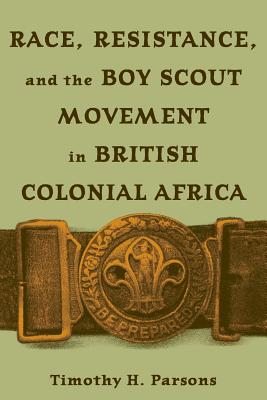

 Ohio University Press
Ohio University Press
Race, Resistance, and the Boy Scout Movement in British Colonial Africa: In British Colonial Africa


Key Metrics
- Timothy H Parsons
- Ohio University Press
- Paperback
- 9780821415962
- 8.94 X 6.48 X 0.91 inches
- 1 pounds
- History > Africa - General
- English
 Secure Transaction
Secure TransactionBook Description
Conceived by General Sir Robert Baden-Powell as a way to reduce class tensions in Edwardian Britain, scouting evolved into an international youth movement. It offered a vision of romantic outdoor life as a cure for disruption caused by industrialization and urbanization. Scouting's global spread was due to its success in attaching itself to institutions of authority. As a result, scouting has become embroiled in controversies in the civil rights struggle in the American South, in nationalist resistance movements in India, and in the contemporary American debate over gay rights.
In Race, Resistance, and the Boy Scout Movement in British Colonial Africa, Timothy Parsons uses scouting as an analytical tool to explore the tensions in colonial society. Introduced by British officials to strengthen their rule, the movement targeted the students, juvenile delinquents, and urban migrants who threatened the social stability of the regime. Yet Africans themselves used scouting to claim the rights of full imperial citizenship. They invoked the Fourth Scout Law, which declared that a scout was a brother to every other scout, to challenge racial discrimination.
Parsons shows that African scouting was both an instrument of colonial authority and a subversive challenge to the legitimacy of the British Empire. His study of African scouting demonstrates the implications and far-reaching consequences of colonial authority in all its guises.
Author Bio
As a social historian of twentieth century Africa, my research focuses on understanding how ordinary people experienced imperial rule and the transformation of colonies into nation states.
My books to date have explored how Africans from diverse walks of life navigated the shifting realities of repression and opportunity that emerged during the imperial and early national eras.
Building on this earlier work, I am currently pursuing several research projects.
- The Historical Geography of Kenyan Identity Formation
- Kenya Becomes a Nation State: Expected and Unexpected Outcomes of Competitive National Imagining During the Transfer of Power, 1959-1972
- A World History of the Twentieth Century
Employment
- Professor, Washington University in St. Louis, 2006 to the Present.
- Director, International and Area Studies, 2010 to 2015.
- Director of Graduate Studies, Department of History, Washington University in St. Louis, 2005 to 2011.
- Associate Professor, Washington University in St. Louis, 2002 to 2006.
- Director, African and Afro-American Studies Program, Washington University in St. Louis, 2003 to 2005, co-director 2013.
- Assistant Professor, Washington University in St. Louis, 1996 to 2002.
Education
- Johns Hopkins University, Ph.D., 1996
- George Washington University, M.A., 1991
- Wesleyan University, B.A., 1985
Source: Washington University in St Louis
Videos
No Videos
Community reviews
Write a ReviewNo Community reviews